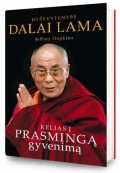 Original language:
English
Original language:
English Translated from: English
Authors: XIV Dalai Lama, Hopkins, Jeffrey
Translated by: Jomantienė, Irena, Dyke, Milda
Full translated source bibliographical description:
His Holiness the Dalai Lama, Jeffrey Hopkins, HOW TO PRACTICE: THE WAY TO A MEANINGFUL LIFE, Pocket Books, New York, 2002.
ISBN: 978-609-8105-07-0
Published in: Vilnius
Published on: 2014
Publisher: Aukso pieva
His Holiness the Dalai Lama has published many books, some for a general audience and others for those particularly interested in Buddhism. In this book he draws on a long tradition of spiritual practice in Tibet and on his own experience to offer suggestions on how to practice the spiritual path that will lead to mental clarity and emotional transformations. This is inspiring book of wisdom, love, kindness, personal moral practice. This book may indicate, how to live a meaningful life, how to find the love for every living creature, how to protect your mind and your thoughts from feelings such as distrust, jealousy and anger. The Book tells about the benefit of morality, about types of meditation, about the help for others, about Tantras. Book is full of exciting descriptions of the living conditions, extensive personal experience is used to explain or justify taught philosophy. The book offers a number of wise practical insight about the human spirit and desires.
Tibetan spiritual leader and Nobel Peace Prize winner, will help you to travel towards enlightenment, quite simply presenting the timeless wisdom and easy everyday practice, attracting the reader with a subtle sense of humor and positive thinking.
Dalai lama born in northeastern Tibet in 1935 and test as a Fourteenth Dalai Lama at the age of two. At the age of five the Dalai Lama was brought to Lhasa, the capital of Tibet, where he underwent the full curriculum of monastic training. Due to the Communist Chinese invasion of eastern Tibet in 1950, he suddenly had to take the reins of Tibetan government at age sexteen. Despite attempst to cooperate with the invaders, he was faced with imminent, personal danger and escaped to India in 1959. In exile, he has successfully re-established centers for the broad range of Tibetan culture. He has traveled extensively throughout most of the world, bringing a message – not just to Buddhists and other religious believers, but to everyone – about the importance of kindness to the very fabric of society. In recognition of his untiring efforts on behalf of Tibetans and all peoples, he was awarded the Nobel Peace Prize in 1989.
